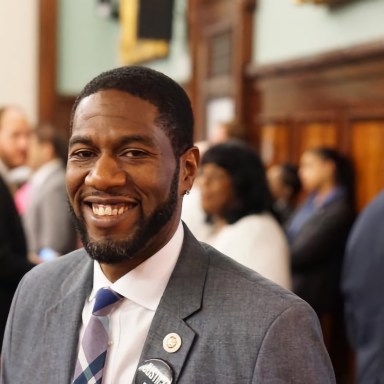Williams highlights issues facing Black migrants

As New York continues to see a large influx of migrants arriving in the city from the southern border of the United States, Public Advocate Jumaane D. Williams on Tuesday highlighted the unique challenges faced by Black migrants.
Among the migrants and asylum-seekers arriving in New York City are nationals of Haiti, Cuba, Venezuela and Nicaragua.
At a City Council joint hearing of the Committees on Immigration and Hospitals, Williams, the son of Grenadian immigrants, emphasized that “the stories of Black immigrants from Africa and the Caribbean often fall on deaf ears, and that this lack of prioritization leads to disparate harm.
“Black migrants have shared their experiences facing racism and anti-Blackness within a system that historically deports, detains and confines Black migrants at a higher rate than any other racial or ethnic group,” the Public Advocate said.
“These are realities the city has to grapple with; and, in order to make any progress, we must hear directly from those living these realities,” he added. “From the local to the federal level, my office and I have been calling for greater resource allocation for Black migrants, and this hearing is a great starting point.”
Williams pointed to language barriers as a key component of undeserving Black immigrant communities, and urged equity in housing and other city services.
“Language accessibility is a lifeline for immigrants and opens doors to legal services, housing, economic empowerment, and other opportunities,” he said. “Many of these migrants are navigating an entirely new city, culture, language and systems after what may have been a long and harrowing journey just to get here.
“On top of all that, they may face increased scrutiny, xenophobia and racism just by nature of being a Black immigrant,” Williams added. “The city, among the existing and future resources it provides and distributes, must ensure that at minimum, there is equity of resources above all else.”
He said while New York City has been responding to an influx of migrants since 2022, and has done “a great deal” in responding to the crisis, “resource allocation could be more equitable than it is now, particularly for Black migrants coming from Caribbean and African countries.”
“I want to make sure we lift up Sudan, Congo and Haiti in particular, who are often left out of the news, as well as some of the other nations in Africa and the Caribbean,” Williams told the hearing. “At this juncture, the city should be well aware that, with migrants coming from all over the world, they also speak a wide variety of languages – as was mentioned, this is not a monolith.
“As a result, city resources should also be in-language as much as possible,” he added. “Black migrants particularly feel the impacts of language barriers, especially if they do not speak English or Spanish. They are more likely to speak languages like Arabic, French, Haitian Creole, Wolof, Mandinka, or Fula, and city resources and information in these languages are more difficult to come by.
“Language accessibility is a lifeline for immigrants and opens doors to legal services, housing, economic empowerment, and other opportunities,” the public advocate continued. “With a preliminary survey of languages that Black migrants speak–which many CBOs (community-based organizations) already have data on – the city should increase its language capacity accordingly.”
With the city’s ongoing 30- and 60-day notices to evict migrant shelter residents – which Williams claims disproportionately affects African migrants – he said “we may see and hear of more instances of migrants sheltering in storefronts and in extreme congregate settings because they have nowhere else to go.”
At the same time, Williams noted that applying for asylum is a legal way to be in this city.
He, however, urged White House and New York Gov. Kathy Hochul to do more to assist the city.
“New York City cannot do this by itself,” Williams said. “I do know there is a gargantuan effort; and, with some of those efforts, I just want to thank the city for trying. But we do know that, even as we await more resources, we have to make sure those resources are applied equitably and humanely. And we have some work to do in those two categories.”
Last month, New York City Mayor Eric Adams announced that the city has reached an agreement with The Legal Aid Society in providing additional flexibility for the “Right to Shelter” for Caribbean and other migrants.
The Legal Aid Society said it is largest, most influential social justice law firm in New York City.
After months of negotiations — during which the city said it has continued to respond to the national humanitarian crisis without “meaningful help” from the federal government — Adams said the parties have come to an agreement that gives the city more tools to manage entries and exits of single adult Caribbean and other migrants from the shelter system and ensure the city has the flexibility it needs to continue supporting vulnerable New Yorkers.
The mayor said the Right to Shelter — put into place over 40 years ago when the city’s shelter system had fewer than 2,500 people in its care — compared to the 120,000 people, about 65,000 of which are migrants, currently in the city’s care — was never meant to apply to a national humanitarian crisis like the one New York City faces today.
“New York City has led the nation in responding to a national humanitarian crisis, providing shelter and care to approximately183,000 new arrivals since the spring of 2022, but we have been clear, from day one, that the ‘Right to Shelter’ was never intended to apply to a population larger than most US cities descending on the five boroughs in less than two years,” said Mayor Adams.
“Today’s stipulation acknowledges that reality and grants us additional flexibility during times of crisis, like the national humanitarian crisis we are currently experiencing,” he added. “Thank you to the court and The Legal Aid Society for recognizing that the status quo cannot continue and for giving New York City additional tools to address this crisis while ensuring that the most vulnerable can continue to receive the support they need.
“Like impacted cities across the country, we cannot bear the brunt of this crisis alone and continue to seek significant support from our federal partners, including expedited work authorizations, more funding and a national resettlement strategy,” the mayor continued.
New York City Corporation Counsel Barbadian-born Sylvia O. Hinds-Radix said: “This agreement represents the tireless, good-faith efforts of the parties and the court to help address one of the biggest crises ever faced by the city.
“The reasonable plan outlined in this settlement significantly enhances the city’s ability to manage the extraordinary influx of people that have come into our care and will help stabilize our shelter system for those who need it,” she added.
Adams’s Chief of Staff Trinidadian-American Camille Joseph Varlack said: “We’ve approached this humanitarian crisis with humanity and the understanding that New York City is the greatest city in the world thanks to our immigrant communities.
“We’re incredibly proud of the work we’ve done to provide shelter and care to approximately 183,000 migrants over the course of the past two years,” she said. “The agreement we’re entering into today reflects the unprecedented nature of this crisis and ensures that we can manage our shelter population while continuing to provide a safe landing spot for our newest arrivals to get on their feet and get on with their pursuit of the American Dream.”
Adams said the agreement allows the city to manage the influx of new arrivals and provide adult migrants 30 days of shelter without the ability to re-apply for shelter, “unless the individual has demonstrated they have some sort of extenuating circumstance necessitating a short additional amount of time in shelter, or have received a reasonable accommodation due to a disability.”
Under the agreement, to better support younger adult new arrivals, individuals under 23 years of age will be provided 60 days of shelter.
Adams said New York City will continue to provide “reticketing services to help more people move out of shelter and continue their journeys towards self-sufficiency.”
He said the settlement applies only to adults seeking shelter and does not impact families with children.
Following a court-supervised mediation, The Legal Aid Society said that it reached an agreement with the city to end the government’s legal challenge to New York’s long-standing Right to Shelter for single adults, established under the case Callahan v. Carey in 1981.
“The terms of the settlement are temporary, as they will only operate during the current humanitarian crisis and apply only to new arrivals who are single adults,” said the Legal Aid Society in a statement. “The agreement preserves the underlying 1981 Right to Shelter consent decree and prevents the government from automatically denying shelter to any group of people if they have no other place to go.
“It guarantees the Right to Shelter for anyone – longer-term New Yorkers and new arrivals alike – while ensuring the city’s compliance with multiple court orders and existing law,” it added.
Among other provisions, the Society said the city is required to address the current influx by eliminating the backlog of new arrivals who have been forced to wait many days for another bed when reapplying for placement.
“This settlement safeguards the right to shelter in the consent decree, ensuring single adults’ – both long-time New Yorkers and new arrivals – access to shelter, basic necessities, and case management to transition from shelter to housing in the community,” said Adriene Holder, chief attorney of the Civil Practice at The Legal Aid Society. “It also requires the city to immediately eliminate the use of waiting rooms as shelters where new arrivals have been sleeping on chairs and floors while they wait for shelter placement.”



